The Best 10 Alternatives to Trend Micro (+ Pricing & Reviews)
Twingate Team
•
Jul 27, 2024

Trend Micro offers a comprehensive range of cybersecurity services, focusing on endpoint security through their Trend Cloud One™ platform. Their solutions include advanced endpoint security, unified visibility, and optimized service options. However, Trend Micro might not be the choice for everyone. This article explores the importance of secure access for distributed workforces.
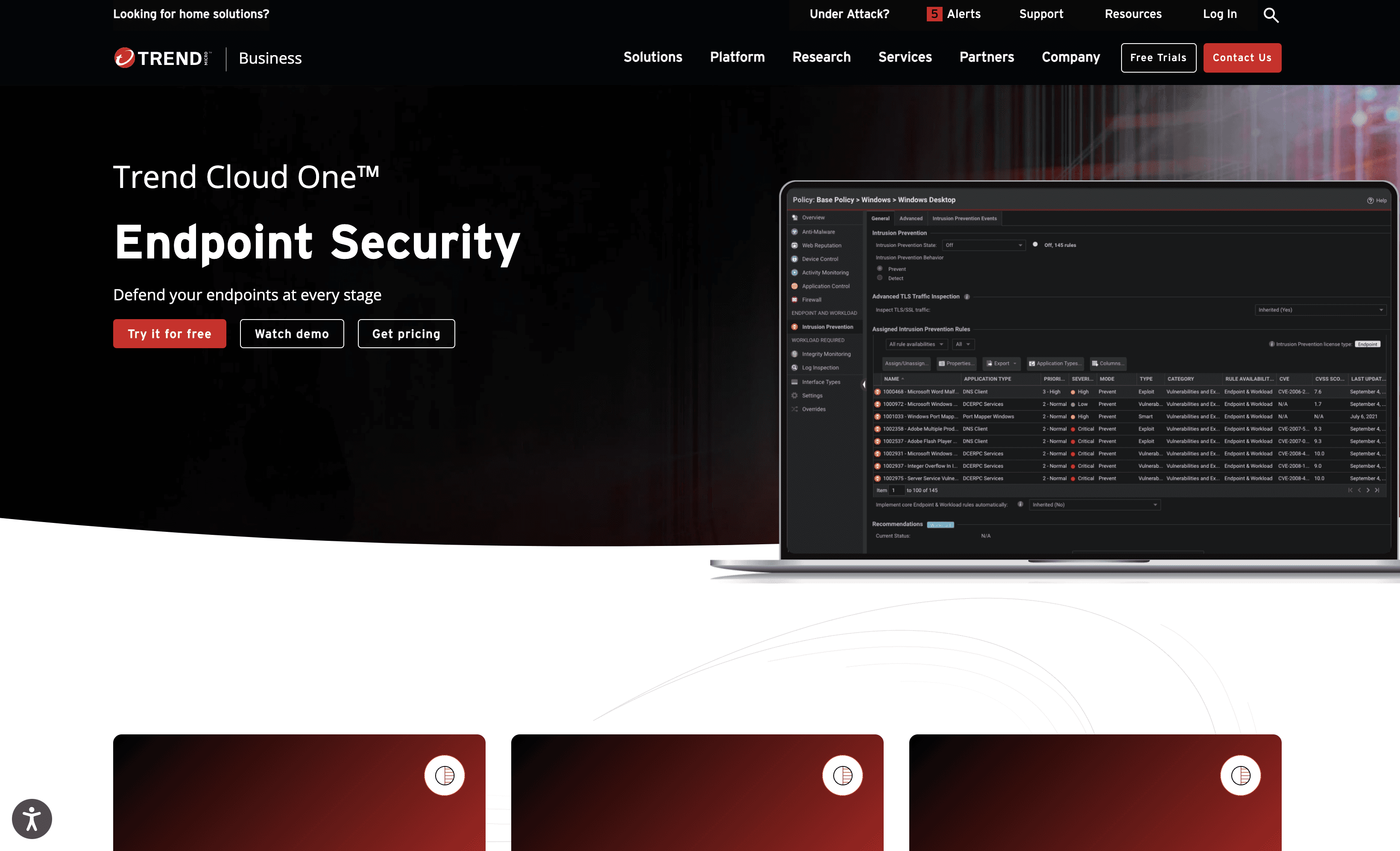
10 Alternatives to Trend Micro
1. Prisma Cloud
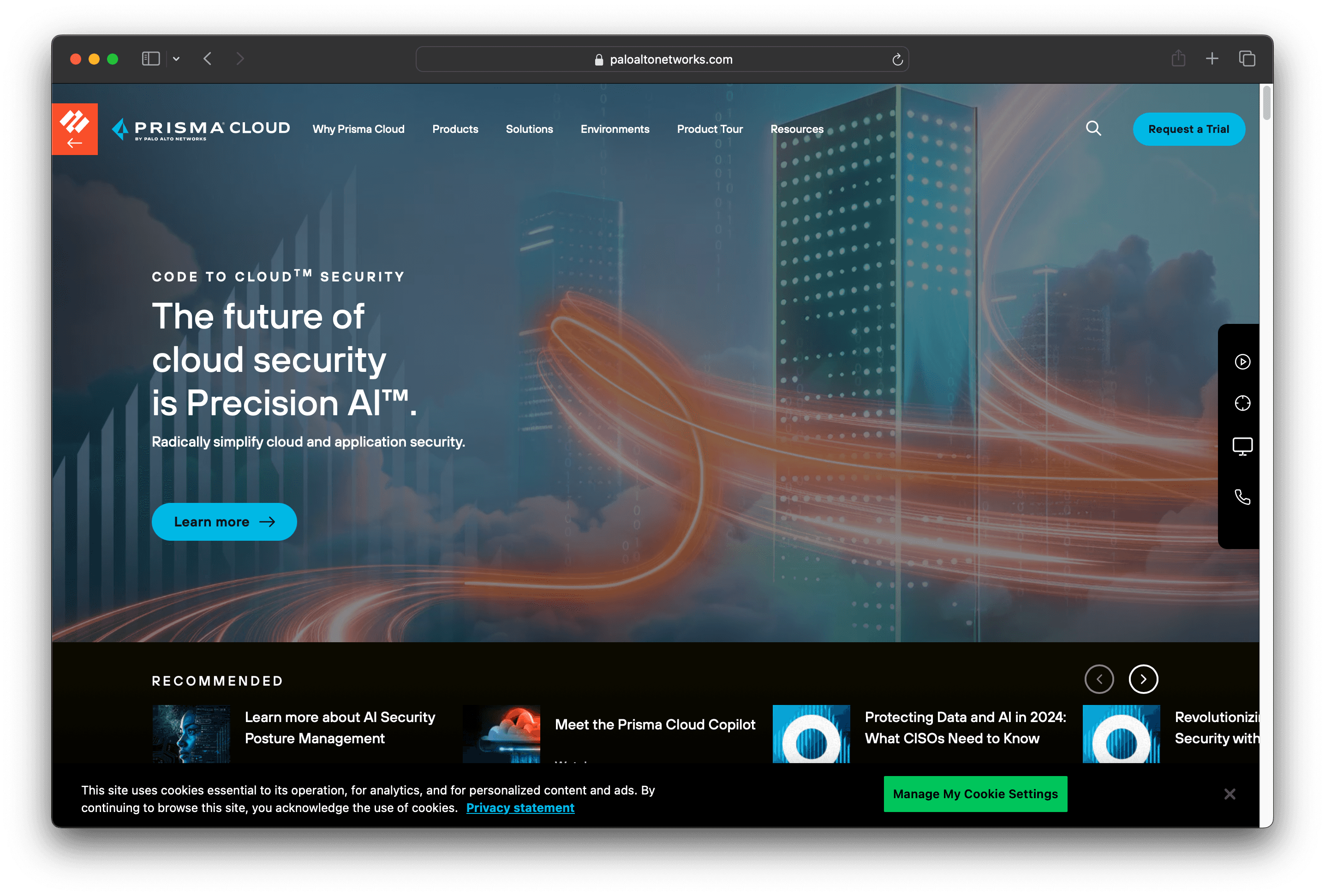
Prisma Cloud is a cloud security platform designed to protect applications and data across multi-cloud environments. It offers comprehensive security features, including threat detection, compliance monitoring, and data protection, all powered by AI. Prisma Cloud aims to simplify cloud security management for businesses of all sizes.
Prisma Cloud Pricing
Prisma Cloud's pricing is not public. Contact their support for more info.
Prisma Cloud Reviews
Prisma Cloud has an overall rating of 3.8 out of 5 stars based on 28 reviews. Users appreciate its comprehensive security features and ease of use. Check out more of our reviews here!
Pros and Cons of Prisma Cloud
Pros:
Comprehensive security across the entire application lifecycle, from code to runtime, ensuring robust protection at every stage.
AI-powered risk insights and prioritization help teams quickly identify and address critical security issues.
Real-time detection and blocking of advanced attacks provide immediate protection against emerging threats.
Cons:
High cost can be a barrier for smaller organizations or those with limited budgets.
Complexity in implementation and integration with existing systems may require significant time and resources.
Potential learning curve for teams to fully utilize all features, impacting initial productivity.
2. Tenable
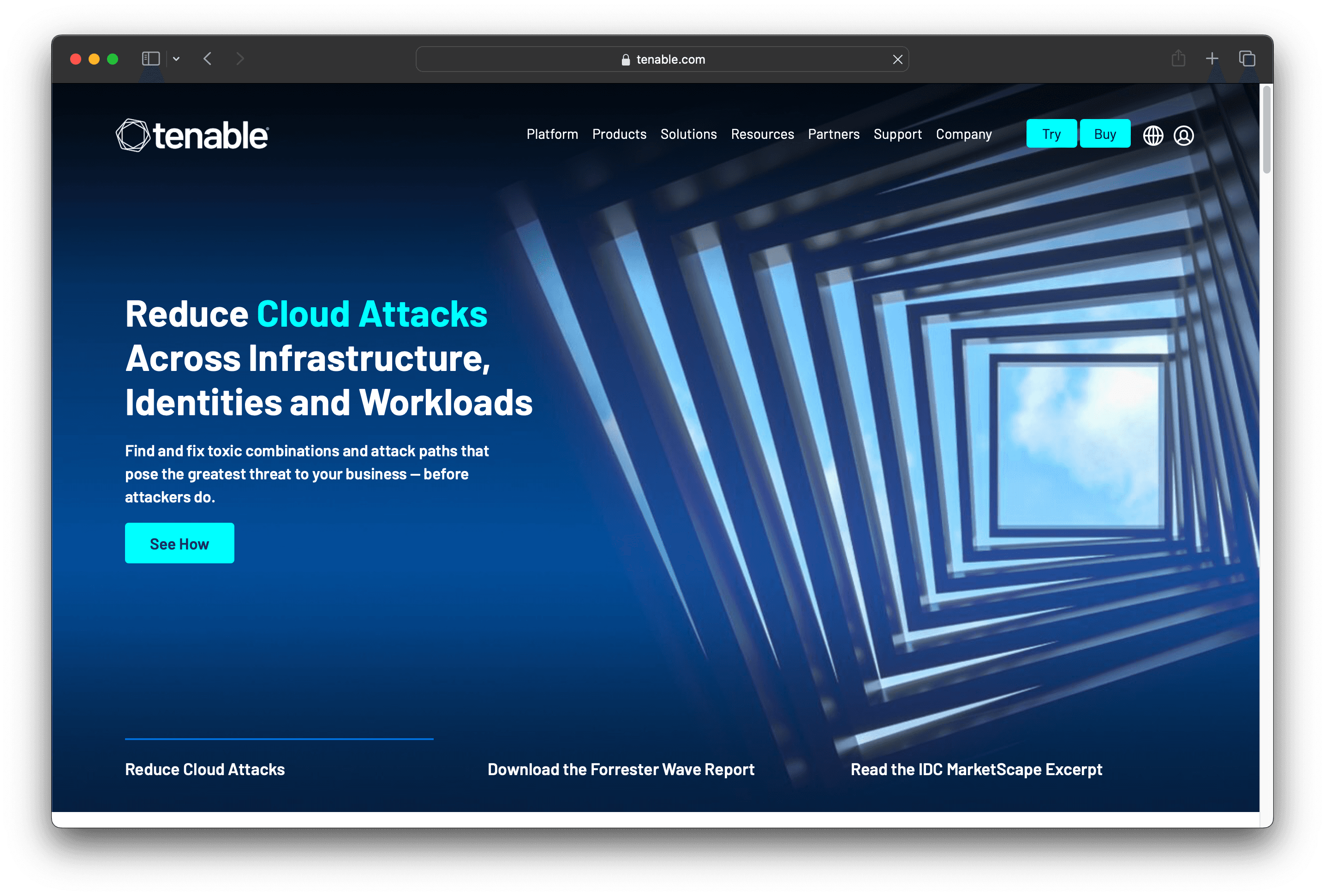
Tenable is a cybersecurity platform designed to manage and mitigate AI and data risks. It offers features like AI Security Posture Management and Data Security Posture Management to help organizations enhance their security posture. Tenable aims to reduce cloud attacks, improve IoT visibility, and manage vulnerabilities effectively.
Tenable Pricing
Tenable Nessus Professional: 1 year: $3,990
Tenable Nessus Professional: 2 years: $7,780.50
Tenable Nessus Professional: 3 years: $11,371.50
Advanced support: $400
Nessus Fundamentals training: $275
Tenable's pricing for other solutions is not public. Contact their support for more info.
Tenable Reviews
Tenable has an overall rating of 4.5 out of 5 stars based on 109 reviews. Users appreciate its intuitive interface and comprehensive asset discovery. Check out more of our reviews here!
Pros and Cons ofTenable
Pros:
Automated Scanning: Tenable's automated scanning capabilities streamline vulnerability detection, saving time and reducing manual effort.
Vulnerability Identification: Efficiently identifies vulnerabilities across various environments, ensuring comprehensive security coverage.
Ease of Use: User-friendly interface simplifies navigation and operation, making it accessible even for those new to cybersecurity.
Cons:
Dashboard Issues: Some users report difficulties with the dashboard, impacting the overall user experience.
Difficult Learning: The learning curve can be steep, requiring significant time to master all features.
Inadequate Reporting: Reporting features may lack depth, limiting detailed analysis and insights.
3. Silver Sky
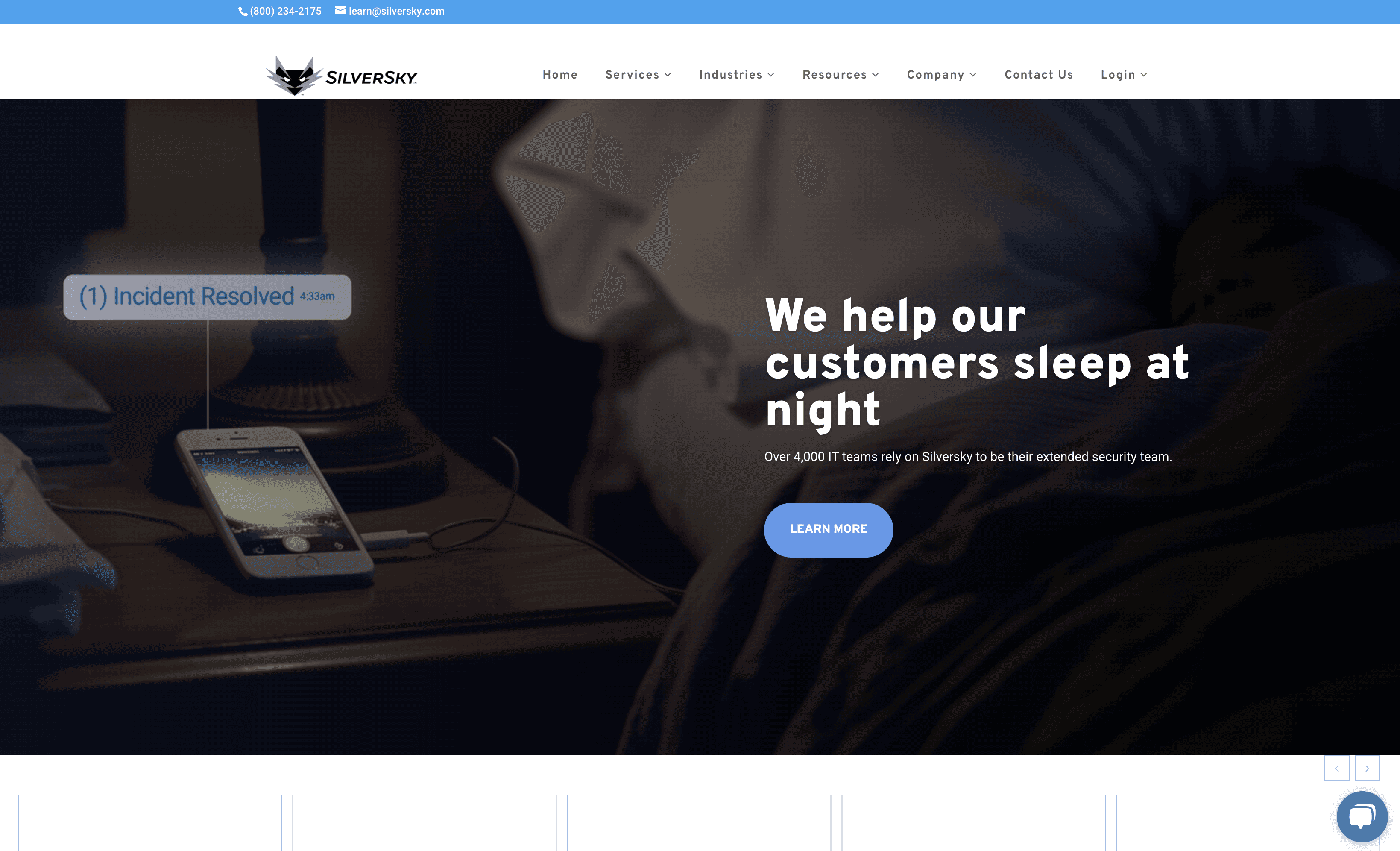
SilverSky is a cybersecurity platform offering Managed Detection and Response services. It combines military-grade behavioral tracking, machine learning, and human analysis to protect against cyber threats. With over 20 years of experience, SilverSky aims to provide comprehensive security solutions for businesses of all sizes.
Silver Sky Pricing
SilverSky's pricing is not public. Contact their support for more info.
Silver Sky Reviews
SilverSky has an overall rating of 4.6 out of 5 stars based on 4 reviews. Users appreciate its stability and reliable service. Check out more of our reviews here!
Pros and Cons of Silver Sky
Pros:
Reliable and Knowledgeable Service: Users appreciate the reliability and expertise of the service, which continually keeps them safe.
Easy-to-Use Portal: The portal is user-friendly and offers detailed and thorough reports.
Stable Service: The service is very stable and used daily by customers.
Cons:
Complexity: The depth and complexity of their services might be overwhelming for smaller organizations or those with less sophisticated IT teams.
Scalability: While technology scales, the page hints that people don’t, which could imply potential limitations in scaling personalized support as the customer base grows.
Navigation Overload: The extensive navigation menu might be confusing for new visitors trying to find specific information quickly.
4. ManageEngine Desktop Central
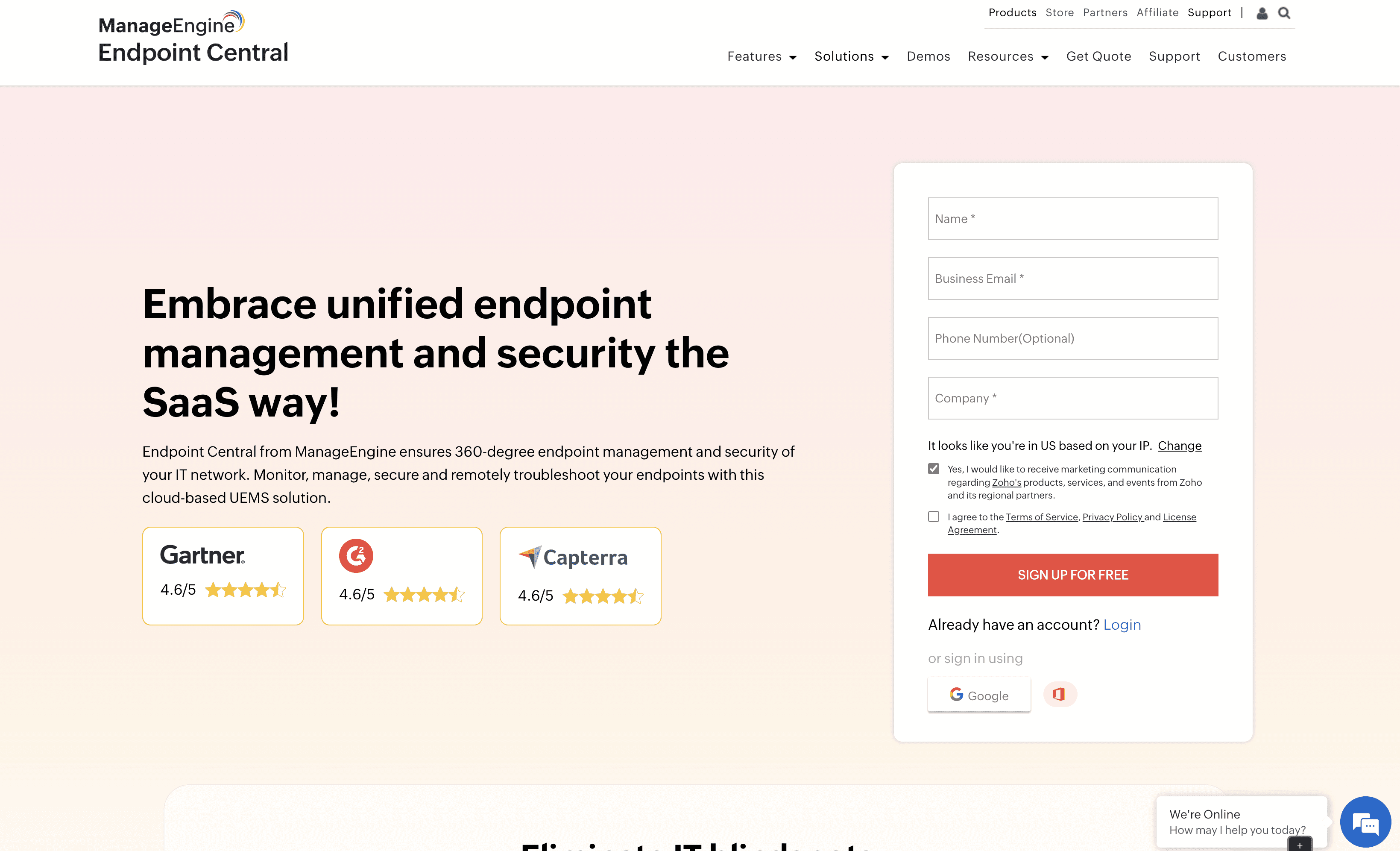
ManageEngine Desktop Central is a unified endpoint management solution designed to simplify IT management. It offers comprehensive tools for managing desktops, laptops, smartphones, and tablets from a single console. With features like patch management, remote troubleshooting, and mobile device management, it aims to streamline IT operations for businesses of all sizes.
ManageEngine Desktop Central Pricing
ManageEngine Desktop Central's pricing is not public. Contact their support for more info.
ManageEngine Desktop Central Reviews
ManageEngine Desktop Central has an overall rating of 4.2 out of 5 stars based on 20 reviews. Users appreciate its wide range of features and seamless integration. Check out more of our reviews here!
Pros and Cons of ManageEngine Desktop Central
Pros:
Comprehensive Endpoint Management: Offers extensive features for managing and securing endpoints, including patch management, vulnerability management, and application deployment.
Cloud-Based Flexibility: Manage endpoints from anywhere, anytime, providing unparalleled convenience for distributed workforces.
User-Friendly Interface: Features like Zero Touch Deployment and built-in templates simplify complex tasks, making it accessible even for less experienced users.
Cons:
Complexity for New Users: The wide range of features can be overwhelming for new users or small businesses without dedicated IT staff.
Dependence on Internet Connectivity: Requires a stable internet connection for optimal performance, which can be a limitation in areas with poor connectivity.
Potential Cost: Comprehensive solutions like this can be expensive, especially for smaller organizations with limited budgets.
5. Sysdig
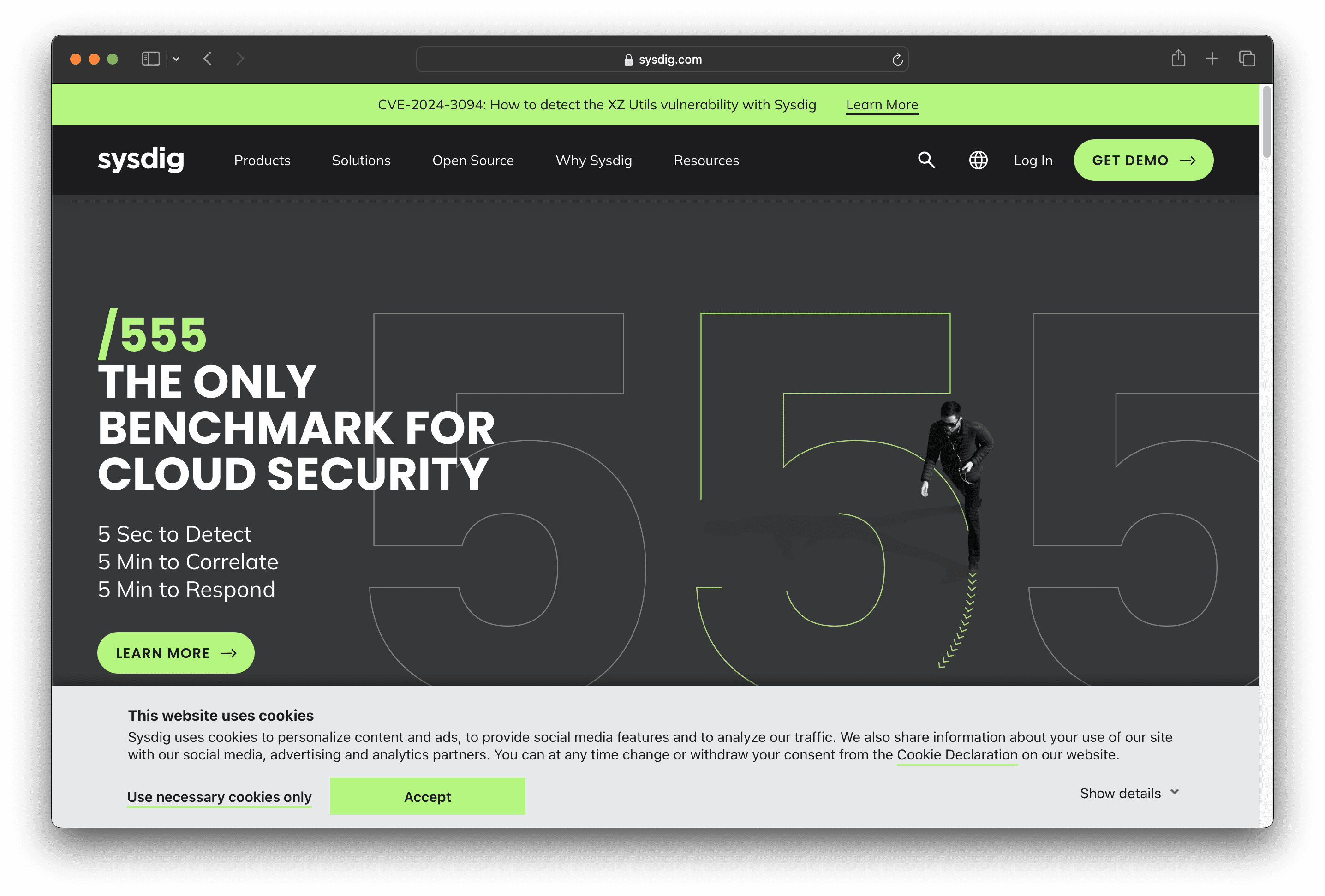
Sysdig is a security platform designed to protect containers, Kubernetes, and cloud environments. It offers real-time threat detection, vulnerability management, and cloud-native application protection. Sysdig aims to simplify security for modern cloud infrastructures, making it accessible and effective for businesses of all sizes.
Sysdig Pricing
Sysdig's pricing is not public. Contact their support for more info.
Sysdig Reviews
Sysdig has an overall rating of 4.8 out of 5 stars based on 77 reviews. Users appreciate the real-time threat detection and comprehensive visibility. Check out more of our reviews here!
Pros and Cons of Sysdig
Pros:
Real-time Threat Detection: Sysdig offers near real-time alerting and detection, ensuring immediate response to potential threats.
Comprehensive Security Features: The platform combines robust security features with an intuitive interface, making it accessible and effective.
High Customer Satisfaction: With 97% of customers willing to recommend Sysdig, user satisfaction is exceptionally high.
Cons:
Feature Limitations: Some users report limitations in certain features, which may not meet all specific needs.
Resource Intensive: The platform can be resource-intensive, requiring significant computational power and memory.
Complexity: Managing a comprehensive security platform like Sysdig can be complex, especially in dynamic cloud environments.
6. Cyberark
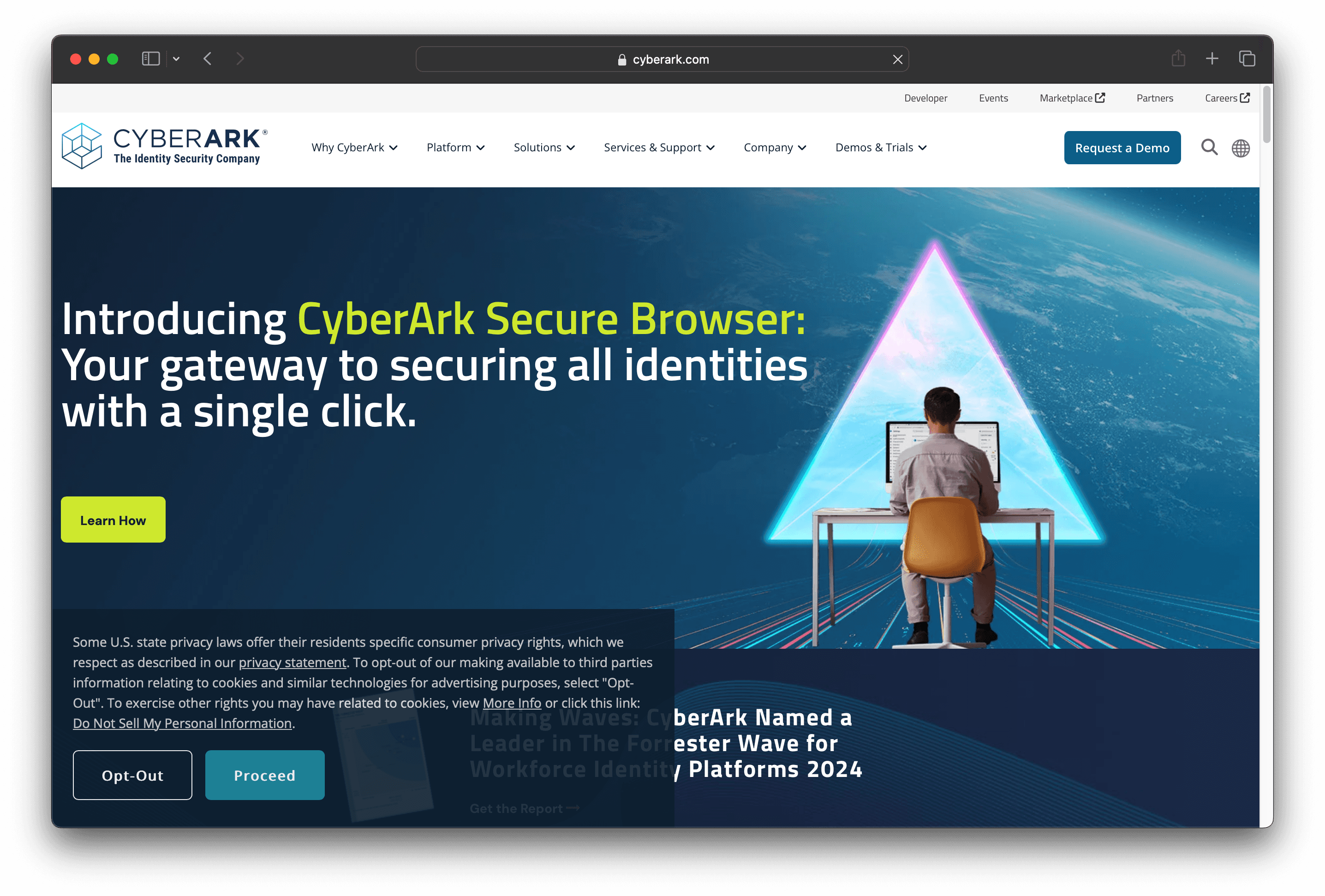
CyberArk is a security platform designed to manage and protect digital identities. It automates access provisioning, identity orchestration, and compliance controls, making it easier for businesses to secure their digital assets. CyberArk aims to streamline identity management processes, ensuring robust security and compliance for organizations of all sizes.
Cyberark Pricing
CyberArk's pricing is not public. Contact their support for more info.
Cyberark Reviews
CyberArk has an overall rating of 4.4 out of 5 stars based on 107 reviews. Users appreciate its security features and ease of use. Check out more of our reviews here!
Pros and Cons of Cyberark
Pros:
Automated Access Provisioning: CyberArk dynamically provisions and revokes access to corporate resources, ensuring that permissions are always up-to-date and secure.
Identity Orchestration: Simplifies and automates complex identity processes, reducing administrative overhead and improving efficiency.
Compliance Controls: Establishes organization-wide compliance and access attestation controls, helping businesses meet regulatory requirements effortlessly.
Cons:
Complex Setup: Initial setup can be intricate, requiring significant time and expertise to configure properly.
Usability Issues: Some users find the platform's complexity challenging, impacting ease of use and overall user experience.
Delayed Response: Users have reported occasional delays in response times, which can hinder timely access management.
7. Orca Security
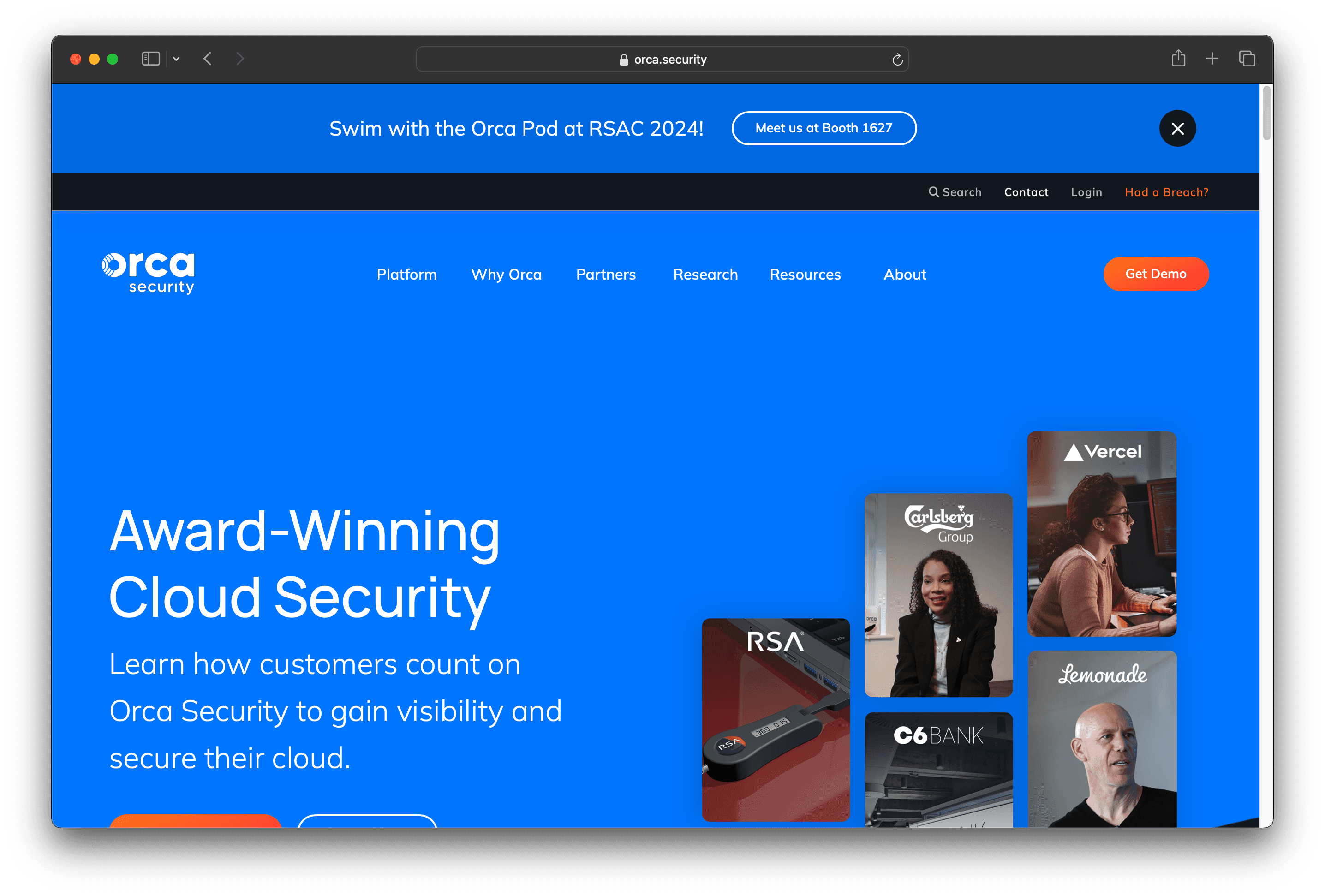
Orca Security is a cloud security platform designed to provide comprehensive protection for cloud environments. It offers features like AI Security Posture Management, vulnerability management, and multi-cloud compliance. Orca Security aims to simplify cloud security with easy onboarding and full-stack visibility, making it accessible for businesses of all sizes.
Orca Security Pricing
Orca Security's pricing is not public. Contact their support for more info.
Orca Security Reviews
Orca Security has an overall rating of 4.6 out of 5 stars based on 167 reviews. Users appreciate its robust cloud monitoring and ease of use. Check out more of our reviews here!
Pros and Cons of Orca Security
Pros:
Agentless Cloud Security: Orca's patented SideScanning technology eliminates the need for agents, reducing gaps in coverage and operational costs.
Easy Onboarding: Quick and efficient onboarding process that automatically detects and monitors new cloud assets.
Comprehensive Coverage: Full-stack visibility and coverage for all cloud assets, including VMs, containers, storage buckets, databases, and serverless applications.
Cons:
Complexity: Managing a comprehensive security platform with multiple features might require significant expertise and resources.
Cost: Advanced security solutions with extensive capabilities can be expensive, which might be a consideration for smaller organizations.
Integration: While Orca offers integrations with various cloud providers and tools, there might be challenges in integrating with specific legacy systems or custom environments.
8. CrowdStrike Falcon
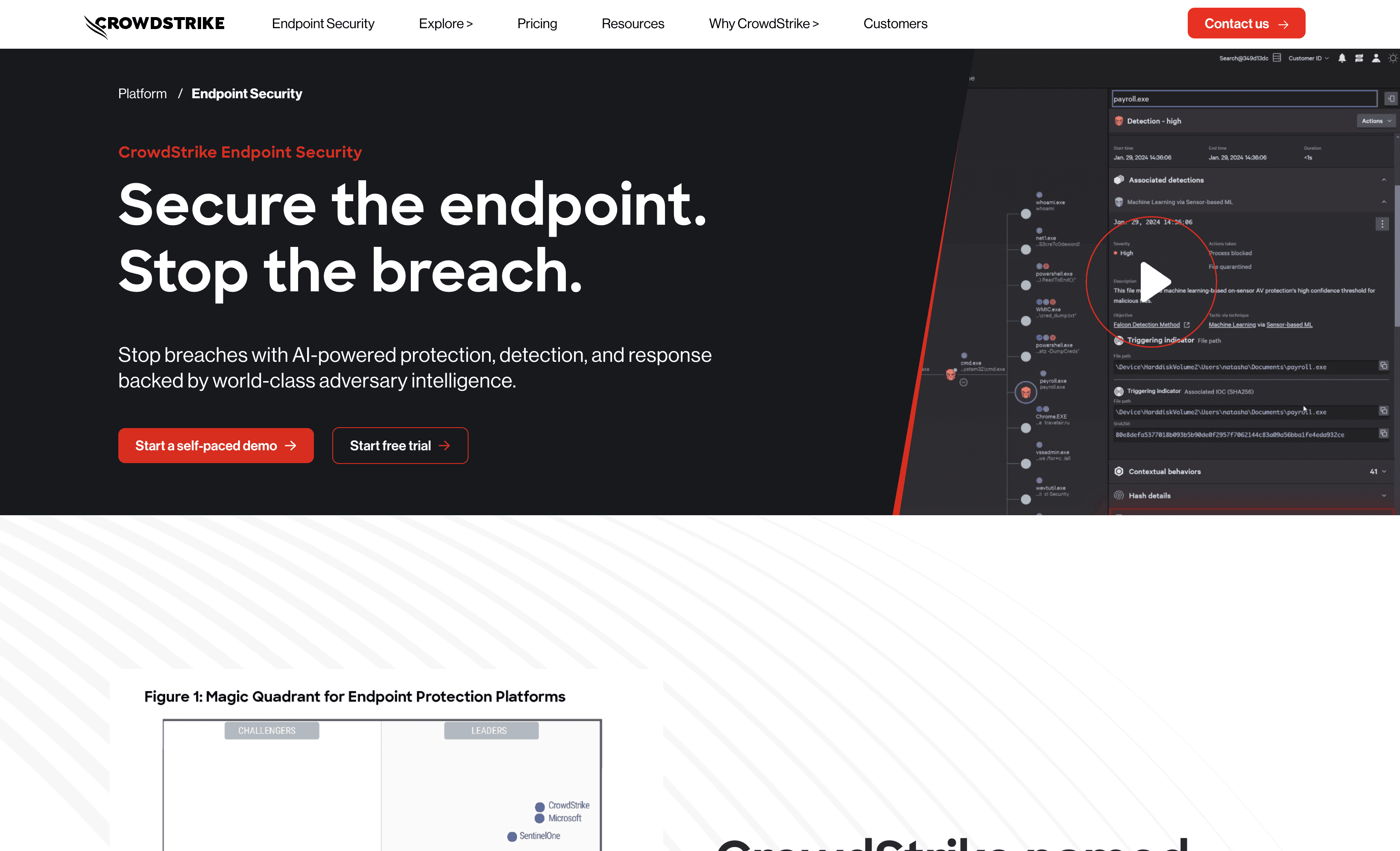
CrowdStrike Falcon is an endpoint security solution designed to protect against breaches with AI-powered threat detection and response. It offers comprehensive protection for various devices, including mobile and cloud environments, ensuring robust security for businesses of all sizes. Falcon aims to simplify security management with easy deployment and centralized control.
CrowdStrike Falcon Pricing
Falcon Pro (Enterprise): $99.99/device per year
Falcon Enterprise: $184.99/device per year
Falcon Elite: Contact sales for pricing
Falcon Go (Small Business): $59.99/device per year
Falcon Pro (Small Business): $99.99/device per year
CrowdStrike Falcon Reviews
CrowdStrike Falcon has an overall rating of 4.7 out of 5 stars based on 278 reviews. Users appreciate its ease of use and comprehensive features. Check out more of our reviews here!
Pros and Cons of CrowdStrike Falcon
Pros:
AI-Powered Protection: Utilizes advanced AI and machine learning to detect and block threats early, ensuring robust security.
Comprehensive Coverage: Protects all major operating systems, including Windows, macOS, Linux, and ChromeOS, offering unified visibility.
Ease of Deployment: Customer testimonials highlight the platform's quick and straightforward deployment, delivering immediate benefits.
Cons:
Complexity for Small Businesses: Advanced features may overwhelm small businesses with limited IT resources, complicating management.
Cost: High level of protection and advanced features come at a premium, potentially straining smaller budgets.
Learning Curve: Sophisticated platform requires time and expertise to fully utilize, posing a challenge for new users.
9. Forcepoint ONE
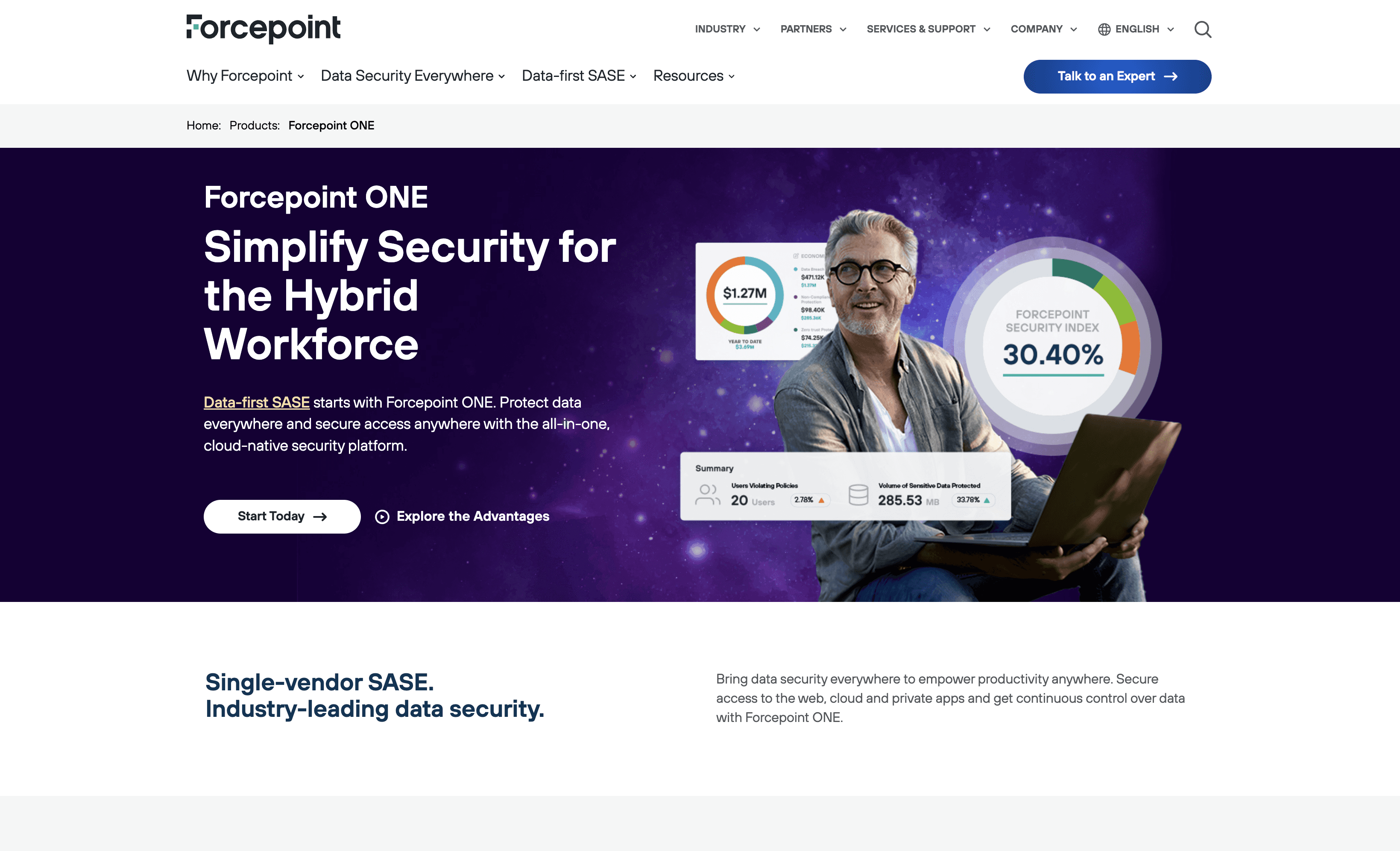
Forcepoint ONE is a cloud-native security platform designed to simplify security for the hybrid workforce. It offers comprehensive data protection and secure access to web, cloud, and private applications. With features like CASB, ZTNA, and Web Security, Forcepoint ONE aims to provide seamless and robust security for businesses of all sizes.
Forcepoint ONE Pricing
Forcepoint ONE's pricing is not public. Contact their support for more info.
Forcepoint ONE Reviews
Forcepoint ONE has an overall rating of 4.2 out of 5 stars based on 21 reviews. Users appreciate its ease of installation and customer support. Check out more of our reviews here!
Pros and Cons of Forcepoint ONE
Pros:
Empower faster and safer work from anywhere: Users can work securely from any location with CASB, ZTNA, and Web Security.
Replace aging and disparate infrastructure: Modernizes and consolidates security infrastructure, reducing complexity.
Adopt Zero Trust principles: Provides identity-based access control and Zero Trust web access, enhancing security.
Cons:
Integration Issues: Users face challenges with integration with other solutions, complicating deployment.
Sync Time: The synchronization time can sometimes be longer than expected, affecting efficiency.
Deployment Complexity: The deployment phase can be difficult and complex, requiring significant expertise.
10. Stream Security
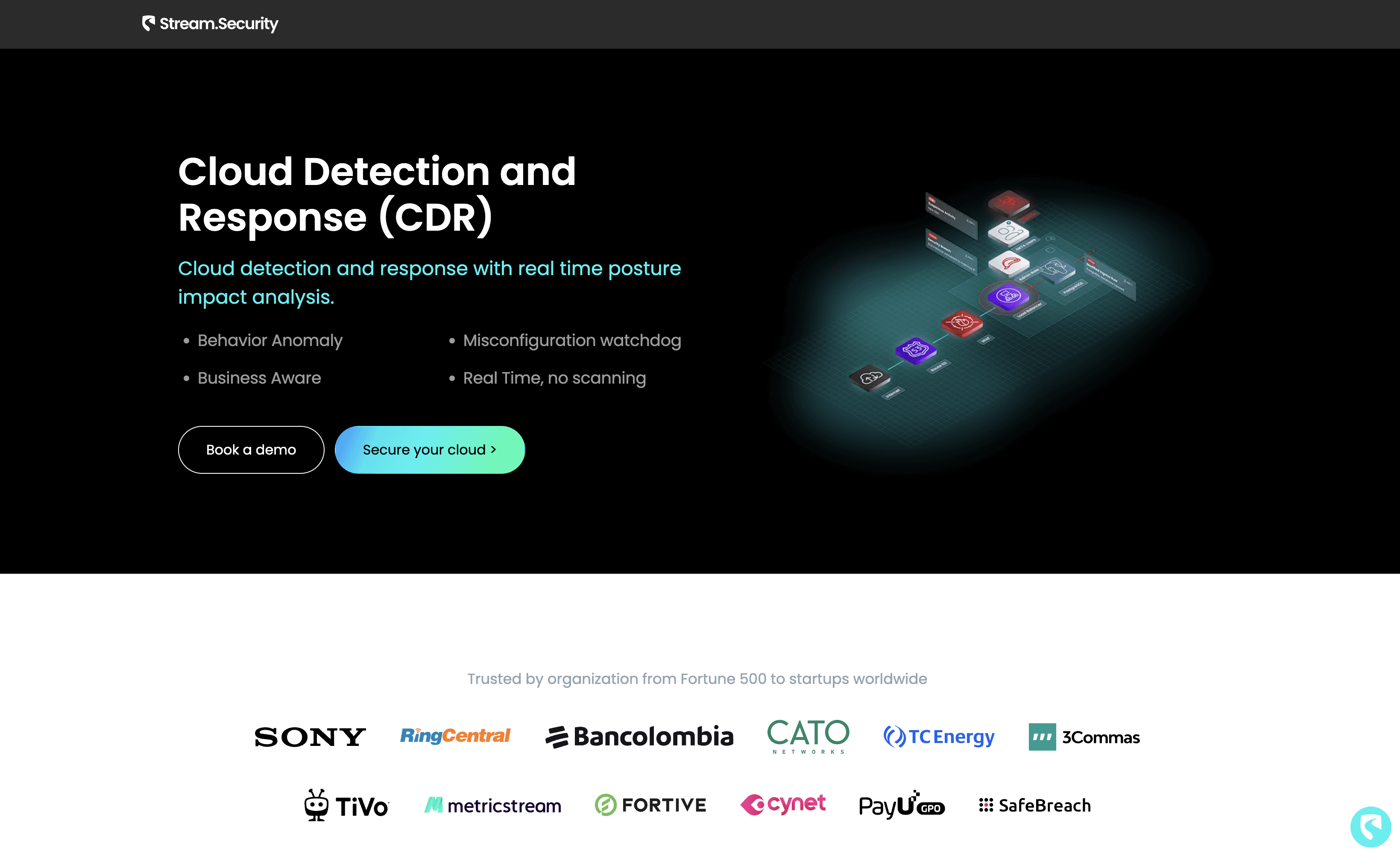
Stream Security is a cloud detection and response solution designed to provide real-time threat detection and posture impact analysis. It offers business-aware customizations and seamless integration with existing workflows, ensuring robust cloud security and compliance for businesses of all sizes.
Stream Security Pricing
Stream Security's pricing is not public. Contact their support for more info.
Stream Security Reviews
Stream Security has an overall rating of 4.0 out of 5 stars based on 10 reviews. Users appreciate its real-time threat detection and seamless integration. Check out more of our reviews here!
Pros and Cons of Stream Security
Pros:
Real-Time Detection: Stream Security offers real-time threat detection, ensuring immediate response to potential risks.
Customizable Guardrails: No-code guardrails allow businesses to tailor security measures to their specific needs effortlessly.
Comprehensive Analysis: Provides deep root cause analysis and event tracking, enhancing investigative capabilities.
Cons:
Security Information: Lack of detailed security information on the seller's page may concern potential users.
Review Shortage: Insufficient reviews on G2 make it challenging for buyers to gauge the product's effectiveness.
Complexity: Managing a comprehensive security platform might require significant expertise and resources.
Looking to secure your technical infrastructure?
Twingate offers granular access controls and deployment automations to protect your VPC environment. By leveraging Zero Trust security tools, Twingate ensures that private resources and internet traffic remain secure in the modern work landscape. Try Twingate for Free today!
Rapidly implement a modern Zero Trust network that is more secure and maintainable than VPNs.
The Best 10 Alternatives to Trend Micro (+ Pricing & Reviews)
Twingate Team
•
Jul 27, 2024

Trend Micro offers a comprehensive range of cybersecurity services, focusing on endpoint security through their Trend Cloud One™ platform. Their solutions include advanced endpoint security, unified visibility, and optimized service options. However, Trend Micro might not be the choice for everyone. This article explores the importance of secure access for distributed workforces.

10 Alternatives to Trend Micro
1. Prisma Cloud

Prisma Cloud is a cloud security platform designed to protect applications and data across multi-cloud environments. It offers comprehensive security features, including threat detection, compliance monitoring, and data protection, all powered by AI. Prisma Cloud aims to simplify cloud security management for businesses of all sizes.
Prisma Cloud Pricing
Prisma Cloud's pricing is not public. Contact their support for more info.
Prisma Cloud Reviews
Prisma Cloud has an overall rating of 3.8 out of 5 stars based on 28 reviews. Users appreciate its comprehensive security features and ease of use. Check out more of our reviews here!
Pros and Cons of Prisma Cloud
Pros:
Comprehensive security across the entire application lifecycle, from code to runtime, ensuring robust protection at every stage.
AI-powered risk insights and prioritization help teams quickly identify and address critical security issues.
Real-time detection and blocking of advanced attacks provide immediate protection against emerging threats.
Cons:
High cost can be a barrier for smaller organizations or those with limited budgets.
Complexity in implementation and integration with existing systems may require significant time and resources.
Potential learning curve for teams to fully utilize all features, impacting initial productivity.
2. Tenable

Tenable is a cybersecurity platform designed to manage and mitigate AI and data risks. It offers features like AI Security Posture Management and Data Security Posture Management to help organizations enhance their security posture. Tenable aims to reduce cloud attacks, improve IoT visibility, and manage vulnerabilities effectively.
Tenable Pricing
Tenable Nessus Professional: 1 year: $3,990
Tenable Nessus Professional: 2 years: $7,780.50
Tenable Nessus Professional: 3 years: $11,371.50
Advanced support: $400
Nessus Fundamentals training: $275
Tenable's pricing for other solutions is not public. Contact their support for more info.
Tenable Reviews
Tenable has an overall rating of 4.5 out of 5 stars based on 109 reviews. Users appreciate its intuitive interface and comprehensive asset discovery. Check out more of our reviews here!
Pros and Cons ofTenable
Pros:
Automated Scanning: Tenable's automated scanning capabilities streamline vulnerability detection, saving time and reducing manual effort.
Vulnerability Identification: Efficiently identifies vulnerabilities across various environments, ensuring comprehensive security coverage.
Ease of Use: User-friendly interface simplifies navigation and operation, making it accessible even for those new to cybersecurity.
Cons:
Dashboard Issues: Some users report difficulties with the dashboard, impacting the overall user experience.
Difficult Learning: The learning curve can be steep, requiring significant time to master all features.
Inadequate Reporting: Reporting features may lack depth, limiting detailed analysis and insights.
3. Silver Sky

SilverSky is a cybersecurity platform offering Managed Detection and Response services. It combines military-grade behavioral tracking, machine learning, and human analysis to protect against cyber threats. With over 20 years of experience, SilverSky aims to provide comprehensive security solutions for businesses of all sizes.
Silver Sky Pricing
SilverSky's pricing is not public. Contact their support for more info.
Silver Sky Reviews
SilverSky has an overall rating of 4.6 out of 5 stars based on 4 reviews. Users appreciate its stability and reliable service. Check out more of our reviews here!
Pros and Cons of Silver Sky
Pros:
Reliable and Knowledgeable Service: Users appreciate the reliability and expertise of the service, which continually keeps them safe.
Easy-to-Use Portal: The portal is user-friendly and offers detailed and thorough reports.
Stable Service: The service is very stable and used daily by customers.
Cons:
Complexity: The depth and complexity of their services might be overwhelming for smaller organizations or those with less sophisticated IT teams.
Scalability: While technology scales, the page hints that people don’t, which could imply potential limitations in scaling personalized support as the customer base grows.
Navigation Overload: The extensive navigation menu might be confusing for new visitors trying to find specific information quickly.
4. ManageEngine Desktop Central

ManageEngine Desktop Central is a unified endpoint management solution designed to simplify IT management. It offers comprehensive tools for managing desktops, laptops, smartphones, and tablets from a single console. With features like patch management, remote troubleshooting, and mobile device management, it aims to streamline IT operations for businesses of all sizes.
ManageEngine Desktop Central Pricing
ManageEngine Desktop Central's pricing is not public. Contact their support for more info.
ManageEngine Desktop Central Reviews
ManageEngine Desktop Central has an overall rating of 4.2 out of 5 stars based on 20 reviews. Users appreciate its wide range of features and seamless integration. Check out more of our reviews here!
Pros and Cons of ManageEngine Desktop Central
Pros:
Comprehensive Endpoint Management: Offers extensive features for managing and securing endpoints, including patch management, vulnerability management, and application deployment.
Cloud-Based Flexibility: Manage endpoints from anywhere, anytime, providing unparalleled convenience for distributed workforces.
User-Friendly Interface: Features like Zero Touch Deployment and built-in templates simplify complex tasks, making it accessible even for less experienced users.
Cons:
Complexity for New Users: The wide range of features can be overwhelming for new users or small businesses without dedicated IT staff.
Dependence on Internet Connectivity: Requires a stable internet connection for optimal performance, which can be a limitation in areas with poor connectivity.
Potential Cost: Comprehensive solutions like this can be expensive, especially for smaller organizations with limited budgets.
5. Sysdig

Sysdig is a security platform designed to protect containers, Kubernetes, and cloud environments. It offers real-time threat detection, vulnerability management, and cloud-native application protection. Sysdig aims to simplify security for modern cloud infrastructures, making it accessible and effective for businesses of all sizes.
Sysdig Pricing
Sysdig's pricing is not public. Contact their support for more info.
Sysdig Reviews
Sysdig has an overall rating of 4.8 out of 5 stars based on 77 reviews. Users appreciate the real-time threat detection and comprehensive visibility. Check out more of our reviews here!
Pros and Cons of Sysdig
Pros:
Real-time Threat Detection: Sysdig offers near real-time alerting and detection, ensuring immediate response to potential threats.
Comprehensive Security Features: The platform combines robust security features with an intuitive interface, making it accessible and effective.
High Customer Satisfaction: With 97% of customers willing to recommend Sysdig, user satisfaction is exceptionally high.
Cons:
Feature Limitations: Some users report limitations in certain features, which may not meet all specific needs.
Resource Intensive: The platform can be resource-intensive, requiring significant computational power and memory.
Complexity: Managing a comprehensive security platform like Sysdig can be complex, especially in dynamic cloud environments.
6. Cyberark

CyberArk is a security platform designed to manage and protect digital identities. It automates access provisioning, identity orchestration, and compliance controls, making it easier for businesses to secure their digital assets. CyberArk aims to streamline identity management processes, ensuring robust security and compliance for organizations of all sizes.
Cyberark Pricing
CyberArk's pricing is not public. Contact their support for more info.
Cyberark Reviews
CyberArk has an overall rating of 4.4 out of 5 stars based on 107 reviews. Users appreciate its security features and ease of use. Check out more of our reviews here!
Pros and Cons of Cyberark
Pros:
Automated Access Provisioning: CyberArk dynamically provisions and revokes access to corporate resources, ensuring that permissions are always up-to-date and secure.
Identity Orchestration: Simplifies and automates complex identity processes, reducing administrative overhead and improving efficiency.
Compliance Controls: Establishes organization-wide compliance and access attestation controls, helping businesses meet regulatory requirements effortlessly.
Cons:
Complex Setup: Initial setup can be intricate, requiring significant time and expertise to configure properly.
Usability Issues: Some users find the platform's complexity challenging, impacting ease of use and overall user experience.
Delayed Response: Users have reported occasional delays in response times, which can hinder timely access management.
7. Orca Security

Orca Security is a cloud security platform designed to provide comprehensive protection for cloud environments. It offers features like AI Security Posture Management, vulnerability management, and multi-cloud compliance. Orca Security aims to simplify cloud security with easy onboarding and full-stack visibility, making it accessible for businesses of all sizes.
Orca Security Pricing
Orca Security's pricing is not public. Contact their support for more info.
Orca Security Reviews
Orca Security has an overall rating of 4.6 out of 5 stars based on 167 reviews. Users appreciate its robust cloud monitoring and ease of use. Check out more of our reviews here!
Pros and Cons of Orca Security
Pros:
Agentless Cloud Security: Orca's patented SideScanning technology eliminates the need for agents, reducing gaps in coverage and operational costs.
Easy Onboarding: Quick and efficient onboarding process that automatically detects and monitors new cloud assets.
Comprehensive Coverage: Full-stack visibility and coverage for all cloud assets, including VMs, containers, storage buckets, databases, and serverless applications.
Cons:
Complexity: Managing a comprehensive security platform with multiple features might require significant expertise and resources.
Cost: Advanced security solutions with extensive capabilities can be expensive, which might be a consideration for smaller organizations.
Integration: While Orca offers integrations with various cloud providers and tools, there might be challenges in integrating with specific legacy systems or custom environments.
8. CrowdStrike Falcon

CrowdStrike Falcon is an endpoint security solution designed to protect against breaches with AI-powered threat detection and response. It offers comprehensive protection for various devices, including mobile and cloud environments, ensuring robust security for businesses of all sizes. Falcon aims to simplify security management with easy deployment and centralized control.
CrowdStrike Falcon Pricing
Falcon Pro (Enterprise): $99.99/device per year
Falcon Enterprise: $184.99/device per year
Falcon Elite: Contact sales for pricing
Falcon Go (Small Business): $59.99/device per year
Falcon Pro (Small Business): $99.99/device per year
CrowdStrike Falcon Reviews
CrowdStrike Falcon has an overall rating of 4.7 out of 5 stars based on 278 reviews. Users appreciate its ease of use and comprehensive features. Check out more of our reviews here!
Pros and Cons of CrowdStrike Falcon
Pros:
AI-Powered Protection: Utilizes advanced AI and machine learning to detect and block threats early, ensuring robust security.
Comprehensive Coverage: Protects all major operating systems, including Windows, macOS, Linux, and ChromeOS, offering unified visibility.
Ease of Deployment: Customer testimonials highlight the platform's quick and straightforward deployment, delivering immediate benefits.
Cons:
Complexity for Small Businesses: Advanced features may overwhelm small businesses with limited IT resources, complicating management.
Cost: High level of protection and advanced features come at a premium, potentially straining smaller budgets.
Learning Curve: Sophisticated platform requires time and expertise to fully utilize, posing a challenge for new users.
9. Forcepoint ONE

Forcepoint ONE is a cloud-native security platform designed to simplify security for the hybrid workforce. It offers comprehensive data protection and secure access to web, cloud, and private applications. With features like CASB, ZTNA, and Web Security, Forcepoint ONE aims to provide seamless and robust security for businesses of all sizes.
Forcepoint ONE Pricing
Forcepoint ONE's pricing is not public. Contact their support for more info.
Forcepoint ONE Reviews
Forcepoint ONE has an overall rating of 4.2 out of 5 stars based on 21 reviews. Users appreciate its ease of installation and customer support. Check out more of our reviews here!
Pros and Cons of Forcepoint ONE
Pros:
Empower faster and safer work from anywhere: Users can work securely from any location with CASB, ZTNA, and Web Security.
Replace aging and disparate infrastructure: Modernizes and consolidates security infrastructure, reducing complexity.
Adopt Zero Trust principles: Provides identity-based access control and Zero Trust web access, enhancing security.
Cons:
Integration Issues: Users face challenges with integration with other solutions, complicating deployment.
Sync Time: The synchronization time can sometimes be longer than expected, affecting efficiency.
Deployment Complexity: The deployment phase can be difficult and complex, requiring significant expertise.
10. Stream Security

Stream Security is a cloud detection and response solution designed to provide real-time threat detection and posture impact analysis. It offers business-aware customizations and seamless integration with existing workflows, ensuring robust cloud security and compliance for businesses of all sizes.
Stream Security Pricing
Stream Security's pricing is not public. Contact their support for more info.
Stream Security Reviews
Stream Security has an overall rating of 4.0 out of 5 stars based on 10 reviews. Users appreciate its real-time threat detection and seamless integration. Check out more of our reviews here!
Pros and Cons of Stream Security
Pros:
Real-Time Detection: Stream Security offers real-time threat detection, ensuring immediate response to potential risks.
Customizable Guardrails: No-code guardrails allow businesses to tailor security measures to their specific needs effortlessly.
Comprehensive Analysis: Provides deep root cause analysis and event tracking, enhancing investigative capabilities.
Cons:
Security Information: Lack of detailed security information on the seller's page may concern potential users.
Review Shortage: Insufficient reviews on G2 make it challenging for buyers to gauge the product's effectiveness.
Complexity: Managing a comprehensive security platform might require significant expertise and resources.
Looking to secure your technical infrastructure?
Twingate offers granular access controls and deployment automations to protect your VPC environment. By leveraging Zero Trust security tools, Twingate ensures that private resources and internet traffic remain secure in the modern work landscape. Try Twingate for Free today!
Rapidly implement a modern Zero Trust network that is more secure and maintainable than VPNs.
The Best 10 Alternatives to Trend Micro (+ Pricing & Reviews)
Twingate Team
•
Jul 27, 2024

Trend Micro offers a comprehensive range of cybersecurity services, focusing on endpoint security through their Trend Cloud One™ platform. Their solutions include advanced endpoint security, unified visibility, and optimized service options. However, Trend Micro might not be the choice for everyone. This article explores the importance of secure access for distributed workforces.

10 Alternatives to Trend Micro
1. Prisma Cloud

Prisma Cloud is a cloud security platform designed to protect applications and data across multi-cloud environments. It offers comprehensive security features, including threat detection, compliance monitoring, and data protection, all powered by AI. Prisma Cloud aims to simplify cloud security management for businesses of all sizes.
Prisma Cloud Pricing
Prisma Cloud's pricing is not public. Contact their support for more info.
Prisma Cloud Reviews
Prisma Cloud has an overall rating of 3.8 out of 5 stars based on 28 reviews. Users appreciate its comprehensive security features and ease of use. Check out more of our reviews here!
Pros and Cons of Prisma Cloud
Pros:
Comprehensive security across the entire application lifecycle, from code to runtime, ensuring robust protection at every stage.
AI-powered risk insights and prioritization help teams quickly identify and address critical security issues.
Real-time detection and blocking of advanced attacks provide immediate protection against emerging threats.
Cons:
High cost can be a barrier for smaller organizations or those with limited budgets.
Complexity in implementation and integration with existing systems may require significant time and resources.
Potential learning curve for teams to fully utilize all features, impacting initial productivity.
2. Tenable

Tenable is a cybersecurity platform designed to manage and mitigate AI and data risks. It offers features like AI Security Posture Management and Data Security Posture Management to help organizations enhance their security posture. Tenable aims to reduce cloud attacks, improve IoT visibility, and manage vulnerabilities effectively.
Tenable Pricing
Tenable Nessus Professional: 1 year: $3,990
Tenable Nessus Professional: 2 years: $7,780.50
Tenable Nessus Professional: 3 years: $11,371.50
Advanced support: $400
Nessus Fundamentals training: $275
Tenable's pricing for other solutions is not public. Contact their support for more info.
Tenable Reviews
Tenable has an overall rating of 4.5 out of 5 stars based on 109 reviews. Users appreciate its intuitive interface and comprehensive asset discovery. Check out more of our reviews here!
Pros and Cons ofTenable
Pros:
Automated Scanning: Tenable's automated scanning capabilities streamline vulnerability detection, saving time and reducing manual effort.
Vulnerability Identification: Efficiently identifies vulnerabilities across various environments, ensuring comprehensive security coverage.
Ease of Use: User-friendly interface simplifies navigation and operation, making it accessible even for those new to cybersecurity.
Cons:
Dashboard Issues: Some users report difficulties with the dashboard, impacting the overall user experience.
Difficult Learning: The learning curve can be steep, requiring significant time to master all features.
Inadequate Reporting: Reporting features may lack depth, limiting detailed analysis and insights.
3. Silver Sky

SilverSky is a cybersecurity platform offering Managed Detection and Response services. It combines military-grade behavioral tracking, machine learning, and human analysis to protect against cyber threats. With over 20 years of experience, SilverSky aims to provide comprehensive security solutions for businesses of all sizes.
Silver Sky Pricing
SilverSky's pricing is not public. Contact their support for more info.
Silver Sky Reviews
SilverSky has an overall rating of 4.6 out of 5 stars based on 4 reviews. Users appreciate its stability and reliable service. Check out more of our reviews here!
Pros and Cons of Silver Sky
Pros:
Reliable and Knowledgeable Service: Users appreciate the reliability and expertise of the service, which continually keeps them safe.
Easy-to-Use Portal: The portal is user-friendly and offers detailed and thorough reports.
Stable Service: The service is very stable and used daily by customers.
Cons:
Complexity: The depth and complexity of their services might be overwhelming for smaller organizations or those with less sophisticated IT teams.
Scalability: While technology scales, the page hints that people don’t, which could imply potential limitations in scaling personalized support as the customer base grows.
Navigation Overload: The extensive navigation menu might be confusing for new visitors trying to find specific information quickly.
4. ManageEngine Desktop Central

ManageEngine Desktop Central is a unified endpoint management solution designed to simplify IT management. It offers comprehensive tools for managing desktops, laptops, smartphones, and tablets from a single console. With features like patch management, remote troubleshooting, and mobile device management, it aims to streamline IT operations for businesses of all sizes.
ManageEngine Desktop Central Pricing
ManageEngine Desktop Central's pricing is not public. Contact their support for more info.
ManageEngine Desktop Central Reviews
ManageEngine Desktop Central has an overall rating of 4.2 out of 5 stars based on 20 reviews. Users appreciate its wide range of features and seamless integration. Check out more of our reviews here!
Pros and Cons of ManageEngine Desktop Central
Pros:
Comprehensive Endpoint Management: Offers extensive features for managing and securing endpoints, including patch management, vulnerability management, and application deployment.
Cloud-Based Flexibility: Manage endpoints from anywhere, anytime, providing unparalleled convenience for distributed workforces.
User-Friendly Interface: Features like Zero Touch Deployment and built-in templates simplify complex tasks, making it accessible even for less experienced users.
Cons:
Complexity for New Users: The wide range of features can be overwhelming for new users or small businesses without dedicated IT staff.
Dependence on Internet Connectivity: Requires a stable internet connection for optimal performance, which can be a limitation in areas with poor connectivity.
Potential Cost: Comprehensive solutions like this can be expensive, especially for smaller organizations with limited budgets.
5. Sysdig

Sysdig is a security platform designed to protect containers, Kubernetes, and cloud environments. It offers real-time threat detection, vulnerability management, and cloud-native application protection. Sysdig aims to simplify security for modern cloud infrastructures, making it accessible and effective for businesses of all sizes.
Sysdig Pricing
Sysdig's pricing is not public. Contact their support for more info.
Sysdig Reviews
Sysdig has an overall rating of 4.8 out of 5 stars based on 77 reviews. Users appreciate the real-time threat detection and comprehensive visibility. Check out more of our reviews here!
Pros and Cons of Sysdig
Pros:
Real-time Threat Detection: Sysdig offers near real-time alerting and detection, ensuring immediate response to potential threats.
Comprehensive Security Features: The platform combines robust security features with an intuitive interface, making it accessible and effective.
High Customer Satisfaction: With 97% of customers willing to recommend Sysdig, user satisfaction is exceptionally high.
Cons:
Feature Limitations: Some users report limitations in certain features, which may not meet all specific needs.
Resource Intensive: The platform can be resource-intensive, requiring significant computational power and memory.
Complexity: Managing a comprehensive security platform like Sysdig can be complex, especially in dynamic cloud environments.
6. Cyberark

CyberArk is a security platform designed to manage and protect digital identities. It automates access provisioning, identity orchestration, and compliance controls, making it easier for businesses to secure their digital assets. CyberArk aims to streamline identity management processes, ensuring robust security and compliance for organizations of all sizes.
Cyberark Pricing
CyberArk's pricing is not public. Contact their support for more info.
Cyberark Reviews
CyberArk has an overall rating of 4.4 out of 5 stars based on 107 reviews. Users appreciate its security features and ease of use. Check out more of our reviews here!
Pros and Cons of Cyberark
Pros:
Automated Access Provisioning: CyberArk dynamically provisions and revokes access to corporate resources, ensuring that permissions are always up-to-date and secure.
Identity Orchestration: Simplifies and automates complex identity processes, reducing administrative overhead and improving efficiency.
Compliance Controls: Establishes organization-wide compliance and access attestation controls, helping businesses meet regulatory requirements effortlessly.
Cons:
Complex Setup: Initial setup can be intricate, requiring significant time and expertise to configure properly.
Usability Issues: Some users find the platform's complexity challenging, impacting ease of use and overall user experience.
Delayed Response: Users have reported occasional delays in response times, which can hinder timely access management.
7. Orca Security

Orca Security is a cloud security platform designed to provide comprehensive protection for cloud environments. It offers features like AI Security Posture Management, vulnerability management, and multi-cloud compliance. Orca Security aims to simplify cloud security with easy onboarding and full-stack visibility, making it accessible for businesses of all sizes.
Orca Security Pricing
Orca Security's pricing is not public. Contact their support for more info.
Orca Security Reviews
Orca Security has an overall rating of 4.6 out of 5 stars based on 167 reviews. Users appreciate its robust cloud monitoring and ease of use. Check out more of our reviews here!
Pros and Cons of Orca Security
Pros:
Agentless Cloud Security: Orca's patented SideScanning technology eliminates the need for agents, reducing gaps in coverage and operational costs.
Easy Onboarding: Quick and efficient onboarding process that automatically detects and monitors new cloud assets.
Comprehensive Coverage: Full-stack visibility and coverage for all cloud assets, including VMs, containers, storage buckets, databases, and serverless applications.
Cons:
Complexity: Managing a comprehensive security platform with multiple features might require significant expertise and resources.
Cost: Advanced security solutions with extensive capabilities can be expensive, which might be a consideration for smaller organizations.
Integration: While Orca offers integrations with various cloud providers and tools, there might be challenges in integrating with specific legacy systems or custom environments.
8. CrowdStrike Falcon

CrowdStrike Falcon is an endpoint security solution designed to protect against breaches with AI-powered threat detection and response. It offers comprehensive protection for various devices, including mobile and cloud environments, ensuring robust security for businesses of all sizes. Falcon aims to simplify security management with easy deployment and centralized control.
CrowdStrike Falcon Pricing
Falcon Pro (Enterprise): $99.99/device per year
Falcon Enterprise: $184.99/device per year
Falcon Elite: Contact sales for pricing
Falcon Go (Small Business): $59.99/device per year
Falcon Pro (Small Business): $99.99/device per year
CrowdStrike Falcon Reviews
CrowdStrike Falcon has an overall rating of 4.7 out of 5 stars based on 278 reviews. Users appreciate its ease of use and comprehensive features. Check out more of our reviews here!
Pros and Cons of CrowdStrike Falcon
Pros:
AI-Powered Protection: Utilizes advanced AI and machine learning to detect and block threats early, ensuring robust security.
Comprehensive Coverage: Protects all major operating systems, including Windows, macOS, Linux, and ChromeOS, offering unified visibility.
Ease of Deployment: Customer testimonials highlight the platform's quick and straightforward deployment, delivering immediate benefits.
Cons:
Complexity for Small Businesses: Advanced features may overwhelm small businesses with limited IT resources, complicating management.
Cost: High level of protection and advanced features come at a premium, potentially straining smaller budgets.
Learning Curve: Sophisticated platform requires time and expertise to fully utilize, posing a challenge for new users.
9. Forcepoint ONE

Forcepoint ONE is a cloud-native security platform designed to simplify security for the hybrid workforce. It offers comprehensive data protection and secure access to web, cloud, and private applications. With features like CASB, ZTNA, and Web Security, Forcepoint ONE aims to provide seamless and robust security for businesses of all sizes.
Forcepoint ONE Pricing
Forcepoint ONE's pricing is not public. Contact their support for more info.
Forcepoint ONE Reviews
Forcepoint ONE has an overall rating of 4.2 out of 5 stars based on 21 reviews. Users appreciate its ease of installation and customer support. Check out more of our reviews here!
Pros and Cons of Forcepoint ONE
Pros:
Empower faster and safer work from anywhere: Users can work securely from any location with CASB, ZTNA, and Web Security.
Replace aging and disparate infrastructure: Modernizes and consolidates security infrastructure, reducing complexity.
Adopt Zero Trust principles: Provides identity-based access control and Zero Trust web access, enhancing security.
Cons:
Integration Issues: Users face challenges with integration with other solutions, complicating deployment.
Sync Time: The synchronization time can sometimes be longer than expected, affecting efficiency.
Deployment Complexity: The deployment phase can be difficult and complex, requiring significant expertise.
10. Stream Security

Stream Security is a cloud detection and response solution designed to provide real-time threat detection and posture impact analysis. It offers business-aware customizations and seamless integration with existing workflows, ensuring robust cloud security and compliance for businesses of all sizes.
Stream Security Pricing
Stream Security's pricing is not public. Contact their support for more info.
Stream Security Reviews
Stream Security has an overall rating of 4.0 out of 5 stars based on 10 reviews. Users appreciate its real-time threat detection and seamless integration. Check out more of our reviews here!
Pros and Cons of Stream Security
Pros:
Real-Time Detection: Stream Security offers real-time threat detection, ensuring immediate response to potential risks.
Customizable Guardrails: No-code guardrails allow businesses to tailor security measures to their specific needs effortlessly.
Comprehensive Analysis: Provides deep root cause analysis and event tracking, enhancing investigative capabilities.
Cons:
Security Information: Lack of detailed security information on the seller's page may concern potential users.
Review Shortage: Insufficient reviews on G2 make it challenging for buyers to gauge the product's effectiveness.
Complexity: Managing a comprehensive security platform might require significant expertise and resources.
Looking to secure your technical infrastructure?
Twingate offers granular access controls and deployment automations to protect your VPC environment. By leveraging Zero Trust security tools, Twingate ensures that private resources and internet traffic remain secure in the modern work landscape. Try Twingate for Free today!
Solutions
Solutions
The VPN replacement your workforce will love.
Solutions